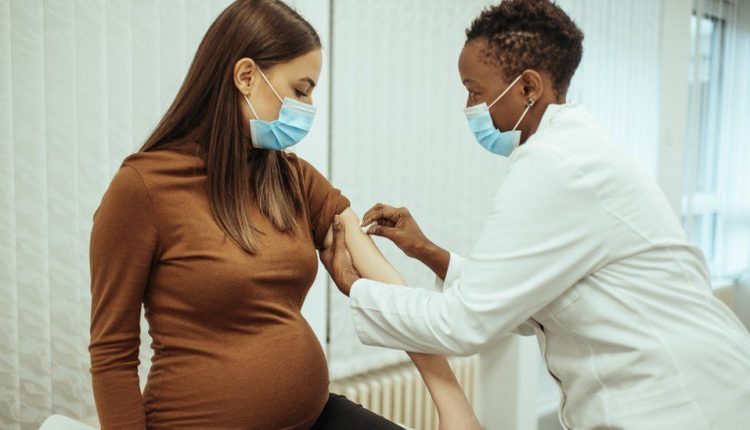Covid vaccine: Pregnant women urged not to delay getting jab
Pregnant women are being urged not to delay getting their Covid jab or booster in a government campaign.
More than 96% of pregnant women admitted to hospital with Covid symptoms between May and October last year were unvaccinated, according to the UK Obstetric Surveillance System.
The campaign will share testimonies of pregnant women who have had the jab on radio and social media.
The government said the vaccine was safe and had no impact on fertility.
- How can I get my booster jab?
- Covid vaccines safe in pregnancy, data shows
- Mums who had Covid urge pregnant women to get jabs
“We have extensive evidence now to show that the vaccines are safe and that the risks posed by Covid-19 are far greater.”
In December, the Joint Committee on Vaccination and Immunisation added pregnant women to the priority list for the vaccine, saying they were at heightened risk from Covid.
Around one in five pregnant women admitted to hospital with the virus needed to be delivered pre-term to help them recover, and one in five of their babies needed care in the neonatal unit, the Department of Health and Social Care (DHSC) said.
Since April 2021, mothers-to-be have been offered the Pfizer-BioNTech or Moderna jab.
Around 84,000 pregnant women have received one dose and more than 80,000 have received two doses of a Covid-19 vaccine since then, the department said.
At the beginning of the UK vaccine programme, the advice was for pregnant women to be offered vaccines if they were in a high-risk group or at high risk of exposure.
This video can not be played
To play this video you need to enable JavaScript in your browser.
Dr Jen Jardine, from the Royal College of Obstetricians and Gynaecologists, who is seven months pregnant and has had her booster jab, said: “Both as a doctor and pregnant mother myself, we can now be very confident that the Covid-19 vaccinations provide the best possible protection for you and your unborn child against this virus.
“I would strongly call on all pregnant women like me, if you haven’t had the vaccine yet, to either speak to your GP or midwife if you still have questions and then book right away today.”
Prof Lucy Chappell, chief scientific adviser to the DHSC, said: “Getting a Covid-19 vaccine is one of the most important things a pregnant woman can do this year to keep herself and her baby as safe from this virus as possible.
“We have extensive evidence now to show that the vaccines are safe and that the risks posed by Covid-19 are far greater.”
The UK recorded 141,472 new cases on Sunday, as well as 97 deaths within 28 days of a positive test – although the number of deaths recorded over weekends tends to be lower because of reporting delays.
The total number of cases over the past seven days is up 6.6% on the previous week, while the figure for deaths is up 30.9%.
Chris Hopson, chief executive of NHS Providers, which represents health trusts, said he was confident the health service’s frontline “will hold”.
However NHS services outside London will be stretched “perilously thin”, he told the BBC’s Sunday Morning show, adding: “We shouldn’t underestimate the degree of pressure that many trusts are seeing.”
Meanwhile, daily testing of 100,000 critical workers in industries including food processing, transport and the border force is due to begin on Monday.
On Sunday, Minister Nadhim Zahawi denied reports the government was planning to stop supplying free lateral flow tests, saying 425 million of them had been ordered in January.
He also told the BBC cutting the self-isolation period for people who test positive to five days would “certainly help” with staff absences.


Comments are closed.